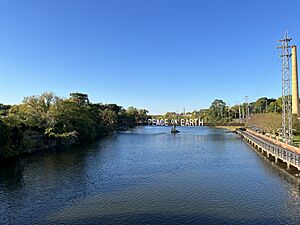Batavia, Illinois facts for kids
Quick facts for kids
Batavia, Illinois
|
||
|---|---|---|
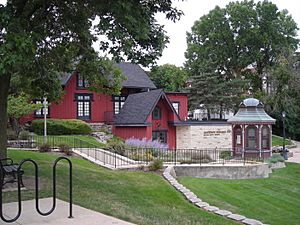
|
||
|
||
| Nicknames:
The Windmill City, City of Energy
|
||
| Motto(s):
"Where Tradition and Vision Meet"
|
||
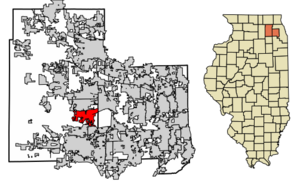
Location of Batavia in Kane and DuPage Counties within Illinois.
|
||
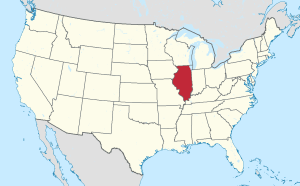
Location of Illinois in the United States
|
||
| Country | United States | |
| State | Illinois | |
| Counties | Kane, DuPage | |
| Townships | Batavia (Kane), Geneva (Kane), Winfield (DuPage) | |
| Settled | 1833 | |
| Incorporated | July 27, 1872 | |
| Government | ||
| • Type | Council–manager | |
| Area | ||
| • Total | 10.84 sq mi (28.06 km2) | |
| • Land | 10.65 sq mi (27.58 km2) | |
| • Water | 0.19 sq mi (0.48 km2) | |
| Elevation | 666 ft (203 m) | |
| Population
(2020)
|
||
| • Total | 26,098 | |
| • Density | 2,450.52/sq mi (946.15/km2) | |
| Time zone | UTC-6 (CST) | |
| • Summer (DST) | UTC-5 (CDT) | |
| ZIP Code(s) |
60510 and 60539
|
|
| Area codes | 630 and 331 | |
| FIPS code | 17-04078 | |
| GNIS feature ID | 2394077 | |
| Wikimedia Commons | Batavia, Illinois | |
Batavia (/bəˈteɪviə/) is a city in Illinois, a state in the United States. It's mostly in Kane County and a small part is in DuPage County. Batavia is part of the larger Chicago metropolitan area. It was started in 1833 and is the oldest city in Kane County. In 2020, about 26,098 people lived there.
Batavia is known as "The Windmill City" because many windmill factories were located here in the late 1800s. Also, the Fermi National Accelerator Laboratory, a big science lab, is just outside the city. Scientists at Fermilab discovered tiny particles called the bottom quark and the top quark.
The city is part of the "Tri-City area" along with St. Charles and Geneva. These are all similar-sized towns west of Chicago.
Contents
History of Batavia
Batavia was first settled in 1833 by Christopher Payne and his family. It was first called Big Woods because of all the wild plants. In 1840, a local judge named Isaac Wilson renamed the town. He named it after his old home, Batavia, New York. That town was named after the Batavian Republic in the Netherlands. Judge Wilson owned most of the town, so he was allowed to change its name.
The Black Hawk War delayed the town's settlement for a year. Famous people like Abraham Lincoln were soldiers in this war. The city officially became a city on July 27, 1872.
In 1875, Mary Todd Lincoln, who was President Abraham Lincoln's wife, stayed at a special hospital for women in Batavia called Bellevue Place. She left the hospital four months later. In the late 1800s, Batavia was a major maker of Conestoga wagons. These wagons were used by people moving west across the country.
By the early 1900s, many water pumps on American farms were powered by windmills. Most of these windmills were made by three companies in Batavia. Today, many old factory buildings made of limestone are still used as offices and shops. The Campana Factory was built in 1936. It made cosmetics, like Italian Balm, a very popular hand lotion at the time.
Geography of Batavia
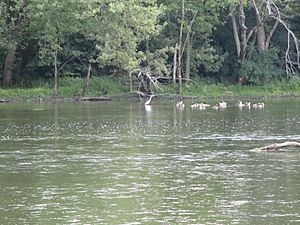
Batavia is located on the Fox River. The city covers about 10.84 square miles (28.06 square kilometers). Most of this area is land, with a small part being water.
People of Batavia
The city's population has grown a lot over the years. Here's how many people have lived in Batavia:
| Historical population | |||
|---|---|---|---|
| Census | Pop. | %± | |
| 1860 | 1,622 | — | |
| 1880 | 2,639 | — | |
| 1890 | 3,543 | 34.3% | |
| 1900 | 3,871 | 9.3% | |
| 1910 | 4,436 | 14.6% | |
| 1920 | 4,395 | −0.9% | |
| 1930 | 5,045 | 14.8% | |
| 1940 | 5,101 | 1.1% | |
| 1950 | 5,838 | 14.4% | |
| 1960 | 7,496 | 28.4% | |
| 1970 | 9,060 | 20.9% | |
| 1980 | 12,574 | 38.8% | |
| 1990 | 17,076 | 35.8% | |
| 2000 | 23,866 | 39.8% | |
| 2010 | 26,045 | 9.1% | |
| 2020 | 26,098 | 0.2% | |
| U.S. Decennial Census 2010 2020 |
|||
Diversity in Batavia
Batavia is home to people from many different backgrounds. The table below shows the racial and ethnic makeup of the city over the years.
| Race / Ethnicity (NH = Non-Hispanic) | Pop 2000 | Pop 2010 | Pop 2020 | % 2000 | % 2010 | % 2020 |
|---|---|---|---|---|---|---|
| White alone (NH) | 21,504 | 22,840 | 21,479 | 90.10% | 87.69% | 82.30% |
| Black or African American alone (NH) | 540 | 611 | 608 | 2.26% | 2.35% | 2.33% |
| Native American or Alaska Native alone (NH) | 16 | 38 | 11 | 0.07% | 0.15% | 0.04% |
| Asian alone (NH) | 319 | 469 | 583 | 1.34% | 1.80% | 2.23% |
| Pacific Islander alone (NH) | 1 | 3 | 2 | 0.00% | 0.01% | 0.01% |
| Other race alone (NH) | 16 | 18 | 77 | 0.07% | 0.07% | 0.30% |
| Mixed race or Multiracial (NH) | 213 | 291 | 944 | 0.89% | 1.12% | 3.62% |
| Hispanic or Latino (any race) | 1,257 | 1,775 | 2,394 | 5.27% | 6.82% | 9.17% |
| Total | 23,866 | 26,045 | 26,098 | 100.00% | 100.00% | 100.00% |
In 2020, there were 26,098 people living in Batavia. About 9,728 households and 6,947 families called Batavia home. The city had about 10,381 housing units.
About 26.3% of the people were under 18 years old. The average age in the city was 38.8 years. The median income for a family was $123,247. This means half of the families earned more than this, and half earned less. About 5.9% of the population lived below the poverty line.
Economy of Batavia
Batavia is home to the U.S. headquarters of Aldi, Inc., a well-known grocery store chain. Many people in Batavia also work at Fermilab, the large physics laboratory located just outside the city.
Here are some of the top employers in Batavia:
| # | Employer | # of employees |
|---|---|---|
| 1 | Fermi Research Alliance | 1,700 |
| 2 | Suncast Corporation | 800 |
| 3 | Aldi, Inc. | 700 |
| 4 | AGCO Corporation | 365 |
| 5 | Power Packaging | 300 |
| 6 | HOBI International | 225 |
| 7 | VWR Scientific | 221 |
| 8 | Batavia Container | 160 |
| 9 | Flinn Scientific Inc. | 150 |
| 10 | DS Containers, Inc. | 140 |
Arts and Culture in Batavia
The Batavia Public Library District serves the city. It started in 1881 and moved to its current building in 2002. The library offers many resources for learning and fun.
Education in Batavia
Most students in Batavia attend schools in Batavia Public School District No. 101. This district has six elementary schools (for grades K-5), one middle school (for grades 6-8), and Batavia High School. Some small parts of the city are served by other school districts.
Transportation in Batavia
Batavia has bus services provided by Pace. Train stations for Metra are nearby in Geneva and Aurora. There are also paths along the Fox River for biking and walking.
Major roads in Batavia include:
- Batavia Avenue (IL-31)
- Main Street (Route 10)
- Randall Road
- Washington Street/River Street (IL-25)
- Wilson Street
Notable People from Batavia
Many interesting people have lived in or are connected to Batavia:
- Ken Anderson: A famous quarterback for the Cincinnati Bengals. He grew up in Batavia.
- Bernard J. Cigrand: Known as the "father of Flag Day". He lived in Batavia.
- Jackie DeShannon: A singer-songwriter from the 1960s. She went to Batavia High School.
- Bill Foster: A U.S. Congressman who lived in Batavia and worked at Fermilab.
- Dan Issel: A basketball player and coach who is in the Basketball Hall of Fame.
- Mary Todd Lincoln: The wife of President Abraham Lincoln. She stayed in Batavia for a time.
- Craig Sager: A sportscaster for TNT and TBS. He was born in Batavia.
See also
 In Spanish: Batavia (Illinois) para niños
In Spanish: Batavia (Illinois) para niños
 | Delilah Pierce |
 | Gordon Parks |
 | Augusta Savage |
 | Charles Ethan Porter |



